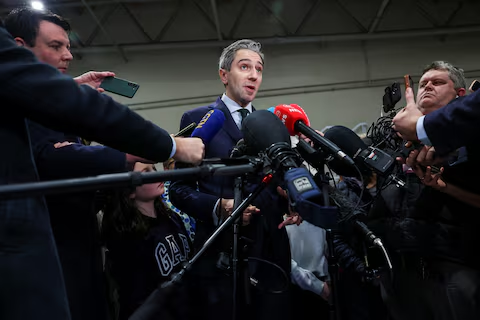Ireland Faces Potential Re-election as Green Party Suffers Setback; Coalition Uncertainty Looms
Ireland’s political landscape is facing a period of uncertainty after the results of Friday’s election suggested that the two main center-right parties, Fianna Fáil and Fine Gael, may be on the path to a re-election. While both parties are expected to gain significant seats, the formation of a majority government could depend on the inclusion of a smaller party in the coalition.
Ireland Faces Potential Re-election as Green Party Suffers Setback; Coalition Uncertainty Looms
Ireland’s political landscape is facing a period of uncertainty after the results of Friday’s election suggested that the two main center-right parties, Fianna Fáil and Fine Gael, may be on the path to a re-election. While both parties are expected to gain significant seats, the formation of a majority government could depend on the inclusion of a smaller party in the coalition.
The Green Party’s disappointing performance in the election has added a layer of complexity to coalition negotiations. The party, which had been a crucial part of the current government, has seen its popularity take a hit, leading to speculation that the new coalition might not include them. As a result, experts predict that Ireland could face a prolonged period of negotiations before the next government is established.
Political analysts suggest that this instability may also impact Ireland’s economy, particularly as the country braces for the inauguration of U.S. President-elect Donald Trump. Trump’s promises to reduce corporate taxes and impose tariffs could present new challenges for Ireland’s economy, especially given its reliance on foreign investment and trade with the U.S.
Election Outcome and Coalition Challenges
The results from Friday’s election are expected to be fully announced by Sunday, but early projections indicate a strong showing for Fianna Fáil and Fine Gael. However, neither party is likely to secure an outright majority, meaning they will need to form a coalition with one or more smaller parties. The Green Party, once an essential partner in government, may not be able to contribute to the formation of a stable alliance due to their significant vote loss.
The prospect of a new coalition raises questions about the stability of the future government. Both Fianna Fáil and Fine Gael have experience in coalition governance but face significant challenges in uniting smaller parties under a common agenda. Given the current political environment, experts caution that it may take weeks or even months of negotiations before a viable government is formed.
Economic Impact and International Relations
In the lead-up to Donald Trump’s inauguration, Ireland’s economy faces a dual challenge: internal political instability and the looming threat of changes in U.S. trade and tax policies. Trump’s administration has signaled plans to reduce corporate tax rates and impose tariffs on certain imports, which could affect Ireland’s key sectors such as technology, pharmaceuticals, and financial services. Many multinational companies, including major U.S. tech firms, have established a strong presence in Ireland due to its favorable corporate tax regime. Any change to these policies could have significant consequences for Ireland’s economic future.
The country’s economy is also heavily tied to its international relationships, particularly with the European Union and the United States. A prolonged period of political instability could create challenges for Ireland in navigating these relationships, especially in light of the uncertainty surrounding Brexit and its potential impact on trade with the U.K.
Looking Ahead
The outcome of Ireland’s election underscores the need for political stability and clear governance. While Fianna Fáil and Fine Gael remain the dominant political forces in the country, their ability to form a lasting coalition government will be crucial in shaping Ireland’s economic and international future. The Green Party’s decline raises questions about the country’s commitment to environmental policies, which had been a cornerstone of the current government.
As the election results are finalized and coalition talks begin, Ireland’s next steps will be watched closely by both domestic and international stakeholders. The decisions made in the coming weeks will have a lasting impact on the country’s economic stability, its role in the European Union, and its relationship with the United States under President Trump’s leadership










